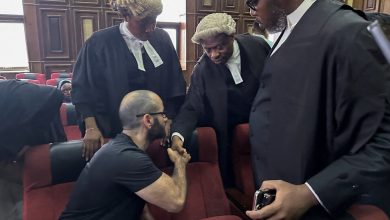A Staunch Critic of the N.Y.P.D. Grapples With Deaths of 2 Officers

On one side of Adam Clayton Powell Jr. Boulevard in Harlem, dozens of candles and bouquets of flowers were clustered outside the 32nd Precinct station house after a shooting that would leave two officers dead.
Across the boulevard was the apartment building where the officers were struck by gunfire as they responded to a report of a domestic incident.
And in between, the neighborhood’s new city councilwoman sat in a bare-bones office, trying to reconcile the need to comfort a grieving community with her firm belief that police departments should ultimately be abolished.
Councilwoman Kristin Richardson Jordan, 35, is a democratic socialist, but she is not a prominent member of New York City’s left wing — she is largely unknown even to like-minded elected officials. She has equated the policing system with slavery and emphasized her deep compassion for both the fallen officers and the man who the police said killed them — positions that are vastly out-of-step with many fellow Democrats.
Her political style, as a revolutionary activist and poet, is distinctive.
But in the context of left wing politics, her overarching argument around policing — that the city should invest far more in social services while cutting spending on law enforcement — is not.
“The greatest way to honor the loss of life on all sides, loss of life due to gun violence,” Ms. Jordan, the granddaughter of a police officer, said in an interview on Monday, “would be to invest in our communities.”
Discussions around policing, justice and how best to ensure public safety have divided Democrats across the country and shaped elections from Long Island to San Francisco. But this week, on that sliver of 135th Street in Harlem, those debates were especially raw.
“Right here,” said Ms. Jordan, who lives a few minutes from where the shooting occurred. “We’re at the center.”
Against the backdrop of the Harlem shooting, Mayor Eric Adams of New York City — a former police captain who battled racism within the system — released an expansive plan on Monday, facing the immense challenge of making good on campaign promises of delivering public safety in a just fashion.
The murder rate and other measures of violent crime in New York City remain far below the rates of the early 1990s, but gun violence in particular has spiked during the pandemic. Mr. Adams’s speech crystallized a national debate around how to respond, following a spate of high-profile crimes that has left many New York City residents shaken and culminated in the shooting deaths of the two officers.
Officer Jason Rivera, 22, was killed while responding to the 911 call on Friday. The death of Officer Wilbert Mora, 27, was announced on Tuesday, a day after Lashawn McNeil, the man who the New York City police said was the gunman, also died from injuries.
On Friday night, Ms. Jordan was hosting a planning meeting and a gathering with fellow Black socialists at her office when she learned of the shooting. She headed to Harlem Hospital, joining other elected officials and Mr. Adams, who gathered for a news conference.
But as many of her colleagues expressed their pain and offered prayers for the police officers on social media, a social media post from Ms. Jordan’s Twitter account sent out that evening focused on community gardens.
It was a preplanned message, she later said, posted “mistakenly” by a staff member — but it touched a nerve on social media.
She did not comment on the police shooting directly for several more hours, because of directions given by officials at the hospital, she said. (Assemblywoman Inez Dickens broadly confirmed those instructions, though others in attendance quickly issued statements of sorrow.)
“I stand with the families of the fallen,” Ms. Jordan later wrote. “The death of police officers is not what abolition is. Abolition is an end to violence altogether.”
In the days since, she said, she prayed with constituents for the recovery of Officer Mora. She attended vigils. She plans to attend the officers’ funerals.
She also indicated that there was a parallel between the loss of the officers’ lives and the death of Lashawn McNeil. “I see every single human life as equivalent,” she said on Monday.
After Officer Mora died from his injuries, Ms. Jordan went a step further.
“My deepest condolences to the families of Officer Rivera, Officer Mora and Lashawn McNeil,” she wrote on Twitter on Tuesday. “Lives lost due to broken public safety & mental health systems that spare nobody.”
Debates around policing and the social safety net played a defining role in the New York City mayoral primary. Many of the working-class voters of color who propelled Mr. Adams to victory — reflecting, in some ways, President Biden’s base — embraced his message of both supporting a powerful role for law enforcement in city life and demanding policing reforms, and those discussions took on fresh urgency again this week in Ms. Jordan’s district.
“They want mutual respect between the police and the community,” Ms. Dickens, who represents an overlapping district, said. “But they want the police.”
At the memorial outside the police station in Harlem, one sign read, “Mayor Adams, N.Y.P.D. need a raise.” Lenny Gardner, 67, a Democrat who works at a hospital, seemed sympathetic to that argument as he walked by.
“They have a hard job, and they’re underpaid and sometimes not given credit for what they do,” said Mr. Gardner, who said he had lived in the area for 33 years and had relied on the police himself. “I’m not with the abolishing police. That’s the only way that we can keep order.”
Ms. Jordan, too, has deep roots in the area, describing herself as a third-generation Harlemite. She attended the Calhoun School, a progressive private school on the Upper West Side, and Brown University and built a career around activism — she was involved in the Black Lives Matter and Occupy Wall Street movements and founded a “cop watch” team, she has said. And she spent time writing and in publishing, including releasing a book that grapples with her own encounters with domestic violence.
She ran for City Council in a crowded primary last year, initially inspired, she told The Nation, by the left-wing members of the “Squad” in Congress. Ms. Jordan identifies as a Black socialist, though groups like the Democratic Socialists of America and the left-wing Working Families Party made no endorsement in that primary. Other prominent left-wing organizations, including the political group associated with Representative Alexandria Ocasio-Cortez, did offer support.
In that ranked-choice election, she ultimately prevailed over the incumbent by around 100 votes.
Asked to assess her performance, Keith L.T. Wright, the chairman of the Manhattan Democratic Party, replied, “I’ve never had a conversation with her, and I don’t know what she does.”
(Ms. Jordan said she welcomed conversations and noted her relationship with the Manhattan Young Democrats. “The future of the Democratic Party is progressive and bold,” she said.)
Patrick J. Lynch, the head of the Police Benevolent Association — a union considered toxic by many Democrats for, among other things, endorsing Donald J. Trump in 2020 — also said that Ms. Jordan “is new to the office and we have had no interactions with her.”
“We are aware of her public statements about police officers and public safety,” he said in a statement. “They don’t reflect what police officers hear from her constituents.”
Ms. Jordan acknowledges “hit-and-miss” dynamics with the police in her district, also saying that she has been both “falsely arrested” and has relied on law enforcement herself when confronting domestic violence.
Her style is far more radical than that of many of her colleagues, but the broadest contours of her approach — to see social services as vital components of public safety — are shared widely among many New York Democrats, including, to some degree, Mr. Adams.
“Deep investments in the communities that have for so long been overlooked and left out, underfunded, disinvested in — that is what will keep our communities safe,” said City Councilwoman Crystal Hudson of Brooklyn.
Since the shooting, Ms. Jordan contacted the families of both the officers and of Mr. McNeil, though as of Tuesday she had not connected with them.
She has also maintained other aspects of her schedule, attending a balloon-festooned inauguration celebration on Saturday night. There, she held a moment of silence to mark the shooting. Then, she recalled, she thanked her team and sought to brace them for the task ahead.
“It’s been a really tough moment to navigate,” she said. “Because people are searching for a villain.”
Susan C. Beachy contributed research.




